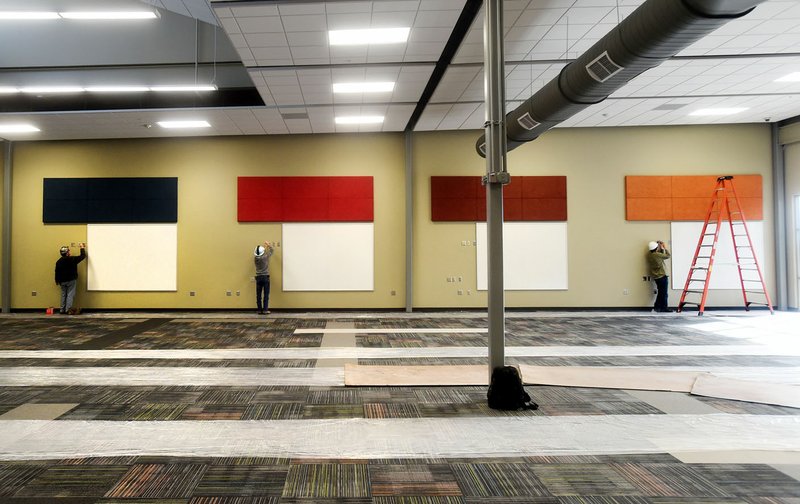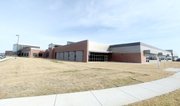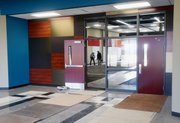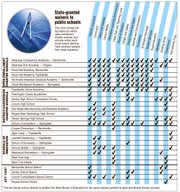Northwest Arkansas public schools are giving students more options for how they learn and the types of classes they take now that the districts can get the same freedom from state regulations charter schools enjoy.
The flexibility has allowed districts to establish programs focused on preparing students for careers and to redesign the school day so students can move at their own pace.
Editor’s note: This region is experiencing a large increase in the types of schools and learning approaches available. The Northwest Arkansas Democrat-Gazette explores those different options and their impact on the education landscape in a seven-part series that began Sunday.
Web Watch
See this and the previous stories in the series at nwaonline.com
Coming tomorrow: Parents choose
The changes are helping traditional school districts find their place in an increasingly competitive education landscape that gives students more options in how and where they receive their education.
Districts now have expanded options for how they can structure their nontraditional offerings, thanks to changes in state laws over the past few years.
They can receive a conversion charter. The charters exempt schools from state regulations while still holding them accountable for academic and financial results, according to the Arkansas Department of Education.
Districts also can open schools of innovation. A 2013 law added this option for districts to "adopt new or creative alternatives" to traditional instruction or administrative practices, according to the department.
Some districts such as Fayetteville have established virtual, online academies. The academy, started in August, enrolled about 60 fourth- through eighth-graders who take all their classes online with the guidance of teachers. A weekly field trip is also offered and a weekly meeting with teachers.
Kindergarten through 12th-grade education in Northwest Arkansas primarily consisted of traditional school districts and private schools when Randy Barrett became the Gentry superintendent 25 years ago. Home schooling also has been an option.
"A lot of the things we're doing now are giving children better chances, better opportunities," Barrett said. "I've tried to say to people, 'You kind of have to ride the crest of the wave of change; otherwise, you may get swept away by it.'"
Motivation to change has come from concerns about students leaving traditional districts for open-enrollment charter schools, home school or other districts, said Denise Airola, director of the Office of Innovation for Education. Districts also are responding to the changing needs of their communities and employers.
Gentry High School introduced a diesel mechanics and career program in response to the needs of businesses and students who weren't headed to college and to keep students from leaving the district, Barrett said.
"We are trying to provide a rich enough curriculum and offerings so that our kids that want to stay here, and maybe wouldn't be able to go somewhere else, that they wouldn't be shortchanged," he said.
Districts may ask the state for exemptions from traditional requirements in areas such as how high school students earn credit, how long all students must be in school each day and licensure requirements for staff.
Another option for seeking exemptions -- or waivers -- came with the passage of Act 1240 in 2015. The law allows traditional school districts to ask the Arkansas Board of Education for the same waivers available to open-enrollment charter schools if the district has at least one student attending the charter school. Open enrollment charter schools like Haas Hall and the Arkansas Arts Academy accept students from any school district.
Eighty-nine school districts across the state have received waivers. Fewer waivers are available to schools of innovation than to district conversion charters, said Alexandra Boyd, the department's director of public charter schools.
No waivers are granted for regulations on school accountability, including state testing requirements, Boyd said.
And districts still must provide the same services for students as they would without a waiver, but they can do that in a different way, Boyd said. Some districts, for example, have waivers to embed gifted and talented strategies in all classes, rather than having a separate gifted and talented program.
The reset button
Motivation for changes in the Gentry School District came from a realization that about 40 percent of students who graduate each year go to college, while the rest generally remain in the region, Barrett said. He noticed many students who graduate college struggle to find a job.
"It caused us to want to press the reset button on where we were focusing and where our priorities are," Barrett said.
Barrett said he wants Gentry High School students to be prepared for college, but he also wants to provide options for students who instead would prefer to graduate with a commercial driver's license and make $60,000 to $80,000 a year driving a tractor-trailer.
"We have focused on the doctors, lawyers and scientists and those careers that require at least a four-year education," Barrett said. "We've all kind of been neglecting those other jobs out there that are easily satisfying career paths for kids who don't mind having a blue collar instead a white one."
A conversion charter approved for Gentry High School allowed for an expansion of career course offerings with instructors who are proficient in their fields but don't have a teaching license, Barrett said.
Gentry school officials started the diesel mechanics program in the 2015-16 school year with waivers, Barrett said. The waivers allowed for a diesel mechanic paid by McKee Foods to teach the course.
Traditional school districts can't receive a waiver from hiring licensed teachers for core academic classes, such as English and math, according to the Education Department.
Where schools such as the Don Tyson School of Innovation and New Technology High School change the daily experience for students, Gentry High School Conversion Charter still functions as it did before the name change, except that a student schedule now might include going to a certified nursing assistant course taught by a nursing instructor from Northwest Arkansas Community College, Barrett said.
Pacing themselves
The Springdale School District has reorganized itself and worked to modify what happens inside classrooms to ensure every child is learning, Superintendent Jim Rollins said. It's a challenge in the diverse, high-poverty school district that has grown to more than 21,500 students, he said.
Rollins wanted to develop a system of instruction where children could move at their own pace and demonstrate their mastery of learning in a scientific, objective way, he said. He also thought students should have the opportunity to earn a two-year associate's degree while in high school if they desire.
Students leaving the Springdale district to enroll at open-enrollment charter schools in the area also motivated him.
"I wanted to put us in the strongest position to make a case that we could teach them all," he said.
A Race to the Top grant awarded in 2013 by the U.S. Department of Education provided $25.88 million over four years for a series of projects focused on personalizing education across the district.
The money went toward the purchase of laptops and tablets for every student and the implementation of advisory programs, student-led parent-teacher conferences and personalized learning plans in all schools, Rollins said. The grant also paid for staff training.
Rollins put his ideas for self-paced learning into framework and worked with his staff to expand and refine it. That thinking provided a foundation for the Tyson School.
Springdale introduced the new school in 2014-15 with about 200 eighth-graders at a temporary site within the Jones Center. In August, the school moved to a new campus that is designed around the instructional program. It now has 520 students in eighth through 10th grade and plans to grow into a school of 1,000 eighth- through 12th-graders.
The school also was granted a district conversion charter to offer a fully virtual curriculum and options for dual-language instruction.
Freshman Daniel Whelan accesses his schoolwork through an online learning management system on his school-issued laptop.
He still takes tests and quizzes in math and science like students in traditional schools, but he has more flexibility during the school day to pursue his interests or get help in another subject.
"We're set up to go to any class that we need to when we need to," Whelan said.
Whelan's science and English classes meet in large open spaces, which also accommodate a handful of other classes at the same time. Each class is marked by a grouping of tables and chairs, a white board and a large television panel, but there are no walls and doors to divide them.
Classes can move around the building to quieter learning zones for tests or louder zones for team projects. Even hallways have stations with flexible seating, white boards and large television panels.
Whelan is working on a project with his engineering teacher and other students to print parts to build and program a robotic arm than can plant and water seeds, remove weeds and harvest what grows.
He has access to a 3-D printer in the campus Environmental and Spatial Technology lab for printing the parts. The engineering and robotics lab is next door. They are among three career and technical education labs that opened this semester. Three more labs will open next semester as construction wraps up.
"After graduation, I don't know if I'm necessarily looking at college," Whelan said. "I may be looking at technical school. With this school, we're going to be adding some more technical courses, which are going to allow me to go straight out of high school with all these technical degrees and be able to get a good-paying job to support myself."
Springdale's approach fits with the Arkansas Department of Education's new vision for student-focused education, a shift toward students having ownership and responsibility over their learning, said Airola, the director of the Office of Innovation for Education.
"If you get away from the clock and from the seven or eight period day, and you allow kids to move and progress through courses like Springdale does with demonstration of mastery or demonstration of the competencies, kids can be in a lot of different places," Airola said.
"They have time to explore," she said.
Menu of choices
The Rogers School District has created choices to meet different needs and desires of students and their families, said Charles Lee, the district's assistant superintendent for secondary curriculum and instruction.
Some families have a strong tie to traditional high schools with football teams, bands and extracurricular activities that give students a sense of belonging, Lee said. Rogers High School and Heritage High School meet those wants.
Other families desire for their child to get a jump-start on college, he said. Some students also prefer to focus on preparing for careers they can enter after graduation in health care or the construction trades, he said.
"We do offer a variety of opportunities now that we haven't offered in the history of education," said Lee, a 28-year educator.
The district this school year began a program with Northwest Arkansas Community College and 47 of the district's 11th-graders who will pursue an associate's degree at the same time they are finishing high school, he said. The district is paying for the program.
A Rogers Honors Academy opens in January that will give some students extra support when they pursue competitive colleges and scholarship opportunities across the country, he said.
Rogers is in the planning stages of establishing a ninth through 12th grade virtual charter school, he said.
The district's conversion charter, New Technology High School, will graduate its second class in May. The school opened in 2013-14 with freshmen and sophomores as an alternative to traditional high school.
Classes are designed for students to learn through projects or solving problems. When a new unit begins, students go through a process of determining what they already know, what they need to know and a list of their next steps, said senior Edgar Fraire. Students ask their teachers for help learning what they don't know.
Many of Fraire's family members went to Rogers High School, but the promise of a laptop interested him in attending New Technology.
He was among the first group of ninth-graders who helped to establish roots for Rogers New Technology, including a culture based on values of respect, trust, responsibility, diligence and "leave no trace," a phrase for keeping the school clean, he said. They are values Fraire helped to establish and feels responsible as a senior for instilling in this year's ninth-graders.
In his final year at Rogers New Technology, Fraire has learned to manage his time without bells to signal the transition between classes, he said. He knows how to manage nervous feelings before making a presentation in front of a class.
It wasn't easy at first. He still remembers finishing a five-minute assignment in ninth grade and his reaction when his teacher said he would have to share his work in a presentation.
"My face would get red," Fraire said. "I would get nervous. I would begin to stutter."
The school environment includes frequent interactions with a partner or group, giving him experience working with many types of personalities, he said. The experiences are preparing him for a career as an industrial engineer, he said.
"I got close with everyone here," Fraire said. "I got used to the environment."
NW News on 12/29/2016




